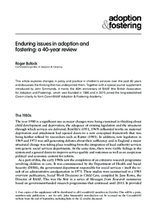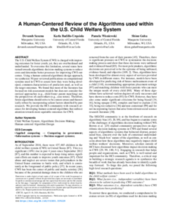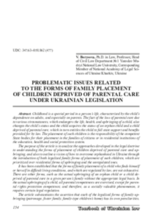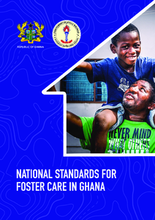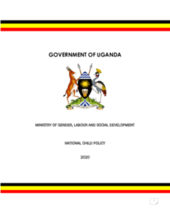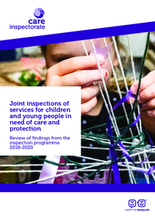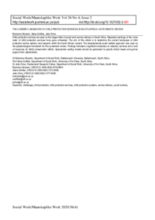Displaying 211 - 220 of 1759
This article from the Canadian Journal of Family Law finds that an Australian version of the Indian Child Welfare Act (ICWA) of the United States is feasible and could significantly reduce Indigenous child removals and the break up of Indigenous families and communities in Australia.
This article explores changes in policy and practice in children’s services in the UK over the past 40 years and discusses the thinking that has underpinned them.
Using a human-centered algorithmic design approach, the authors of this study synthesize 50 peer-reviewed publications on computational systems used in the U.S. Child Welfare System (CWS) to assess how they were being developed, common characteristics of predictors used, as well as the target outcomes.
This book brings together knowledge of how modern countries in Europe and the United States deal with the issue of errors and mistakes in child protection in a cross-national perspective.
The purpose of the article is to analyze the approaches developed in the legal doctrine to understanding the forms of placement of children deprived of parental care and upbringing, and also to outline a vision of how to overcome orphanhood in Ukraine through the introduction of both legalized family forms of placement of such children, which are prioritized over residential forms of upbringing and the unregulated ones.
These Standards for Foster Care are available to all stakeholders engaged in the protection, care and support of children where foster care provision may be required. These Standards are intended to guide social workers and other service providers in monitoring foster care services.
This National Child Policy of Uganda has been developed to coordinate the efforts of the different sectors that have a direct and indirect mandate on children and deliver a comprehensive package of services encompassing all the four cardinal rights of the child (to survival, development, protection and participation) in a multi-sectoral approach.
This report is a review of the findings of joint inspections of the delivery of services to children and young people in need of care and protection by community planning partnerships in eight areas across Scotland, undertaken 2018 – 2020.
The aim of this article is to determine the current landscape of child protection service delivery and research within the South African context.
This article argues that the patchwork of legal protections across U.S. states means that many LGBTQ-headed families lack needed security, stability, and legal recognition.


